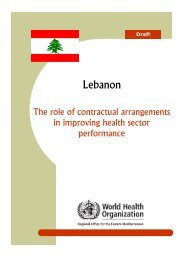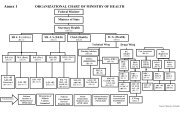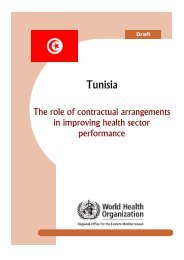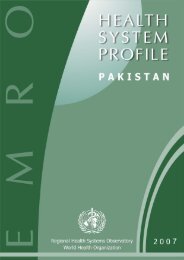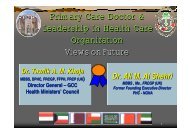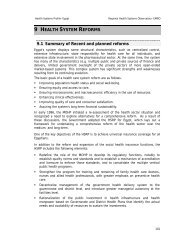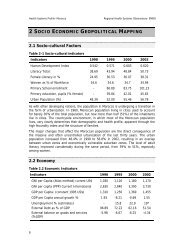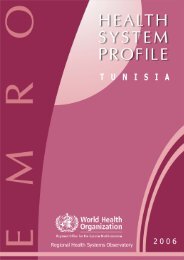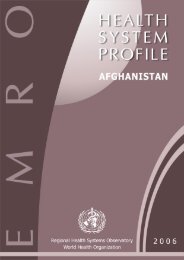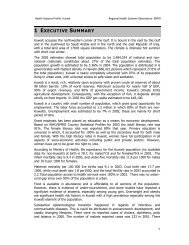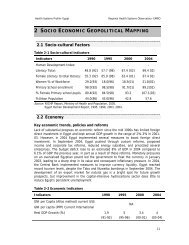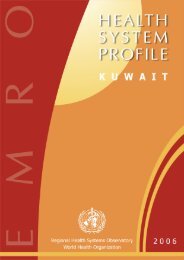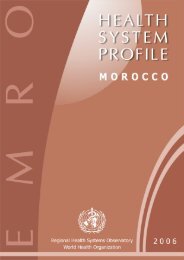Social determinants of health in countries in conflict - What is GIS ...
Social determinants of health in countries in conflict - What is GIS ...
Social determinants of health in countries in conflict - What is GIS ...
You also want an ePaper? Increase the reach of your titles
YUMPU automatically turns print PDFs into web optimized ePapers that Google loves.
42 <strong>Social</strong> <strong>determ<strong>in</strong>ants</strong> <strong>of</strong> <strong>health</strong> <strong>in</strong> <strong>countries</strong> <strong>in</strong> <strong>conflict</strong><br />
among IDPs; and doctors have started see<strong>in</strong>g d<strong>is</strong>eases that they have rarely seen before,<br />
such as typhoid, hepatit<strong>is</strong> and measles.<br />
Noncommunicable d<strong>is</strong>eases <strong>in</strong>clude chronic illnesses, such as hypertension and<br />
diabetes mellitus, which are <strong>in</strong>creas<strong>in</strong>g; patients suffer because <strong>of</strong> shortage <strong>of</strong> medication,<br />
poor quality <strong>of</strong> medic<strong>in</strong>es and poor case management (on problems <strong>of</strong> stor<strong>in</strong>g and<br />
d<strong>is</strong>tribut<strong>in</strong>g <strong>in</strong>sul<strong>in</strong>, see Mansour and Wanoose, 2007 [103]). An <strong>in</strong>crease <strong>in</strong> leukaemia<br />
was noted over the last year <strong>in</strong> Basra, the west <strong>of</strong> Iraq and <strong>in</strong> Baghdad.<br />
Other <strong>health</strong> problems <strong>in</strong>clude drug abuse and mental illness. Drug abuse, especially<br />
among young people, <strong>is</strong> evidenced by the <strong>in</strong>creas<strong>in</strong>g number <strong>of</strong> people be<strong>in</strong>g taken to<br />
hospital as a result <strong>of</strong> an overdose. Mental illness, especially depression, <strong>is</strong> difficult to<br />
deal with because <strong>of</strong> the stigma associated with it.<br />
S<strong>in</strong>ce April 2003 doctors have reported see<strong>in</strong>g new k<strong>in</strong>ds <strong>of</strong> <strong>in</strong>juries from the <strong>conflict</strong>,<br />
<strong>in</strong>clud<strong>in</strong>g <strong>in</strong>juries from cluster bombs, and over the last year, an <strong>in</strong>crease <strong>in</strong> multi-shell<br />
<strong>in</strong>juries (<strong>in</strong>clud<strong>in</strong>g nails) mostly on the head and chest; patients with such <strong>in</strong>juries die<br />
before reach<strong>in</strong>g hospital because <strong>of</strong> severe bleed<strong>in</strong>g and the lack <strong>of</strong> first aid at the scene<br />
or <strong>in</strong> the ambulance. New weapons cause suffocation and first and second degree burns;<br />
doctors <strong>in</strong> Ramadi reported two attacks with chlor<strong>in</strong>e gas which killed victims and spread<br />
irritat<strong>in</strong>g toxic gas <strong>in</strong> the surround<strong>in</strong>g area; most victims were children. Burns units do<br />
not have the capacity to deal with these <strong>in</strong>juries.<br />
Doctors who were <strong>in</strong>terviewed were concerned about breaches <strong>of</strong> medical neutrality,<br />
<strong>in</strong> contravention <strong>of</strong> the Geneva Convention, which they considered to be underm<strong>in</strong><strong>in</strong>g<br />
the whole <strong>health</strong> system. They referred to attacks on <strong>health</strong> units and arrests <strong>of</strong> <strong>health</strong><br />
workers. In addition, they noted that ethnic and political d<strong>is</strong>crim<strong>in</strong>ation was rife with<br />
most employees <strong>in</strong> a facility com<strong>in</strong>g from the same ethnic background or shar<strong>in</strong>g the<br />
same political affiliation; doctors also alleged that the militias were <strong>in</strong>filtrat<strong>in</strong>g the<br />
M<strong>in</strong><strong>is</strong>try <strong>of</strong> Health and the hospitals.<br />
The doctors <strong>in</strong>terpreted the overall outcome <strong>of</strong> th<strong>is</strong> situation as contribut<strong>in</strong>g to the<br />
breakdown <strong>of</strong> trust and confidence between patients and <strong>health</strong> providers, for example,<br />
people are afraid to go to a provider or facility associated with a different ethnic or<br />
political background, and to the mass migration <strong>of</strong> <strong>health</strong> workers from Iraq; the M<strong>in</strong><strong>is</strong>try<br />
<strong>of</strong> Health estimates that one half <strong>of</strong> the country’s doctors have fled [37].<br />
Doctors reported the development <strong>of</strong> cop<strong>in</strong>g strategies to respond to the <strong>health</strong><br />
cr<strong>is</strong><strong>is</strong> such as: doctors open<strong>in</strong>g cl<strong>in</strong>ics <strong>in</strong> their homes rather than <strong>in</strong> commercial areas,<br />
which they see as less secure; people v<strong>is</strong>it<strong>in</strong>g pharmacies or a local nurse rather than a<br />
doctor; people return<strong>in</strong>g to the use <strong>of</strong> natural remedies and herbs; and women return<strong>in</strong>g<br />
to dependence on midwives and on deliver<strong>in</strong>g at home.<br />
SDH-chapters-<strong>countries</strong> <strong>in</strong> <strong>conflict</strong>-7 Oct.<strong>in</strong>dd 42 08/10/2008 14:24:52



